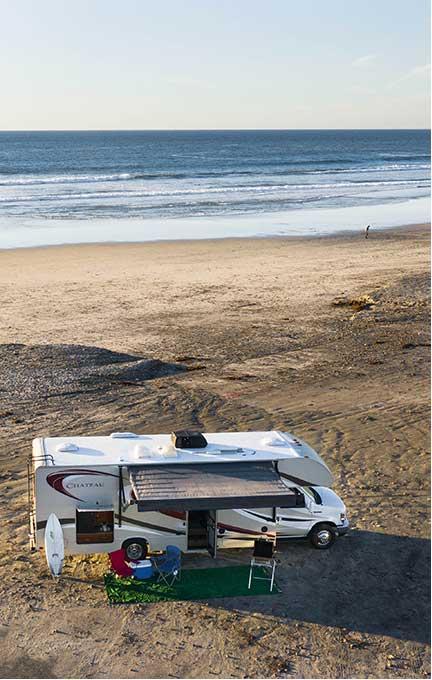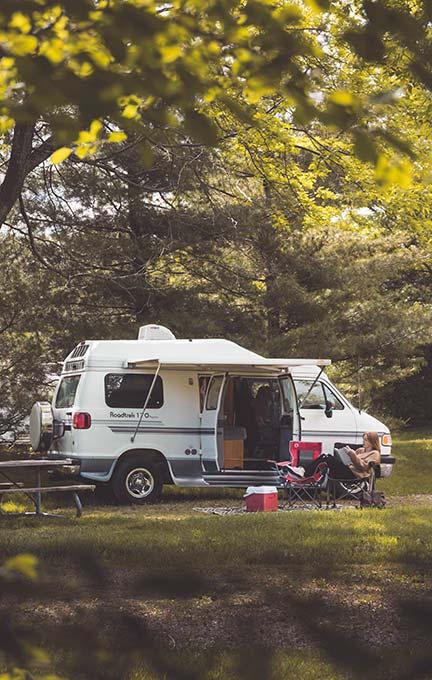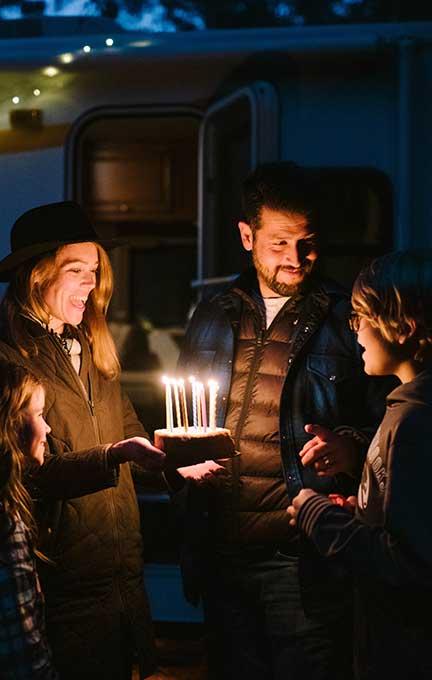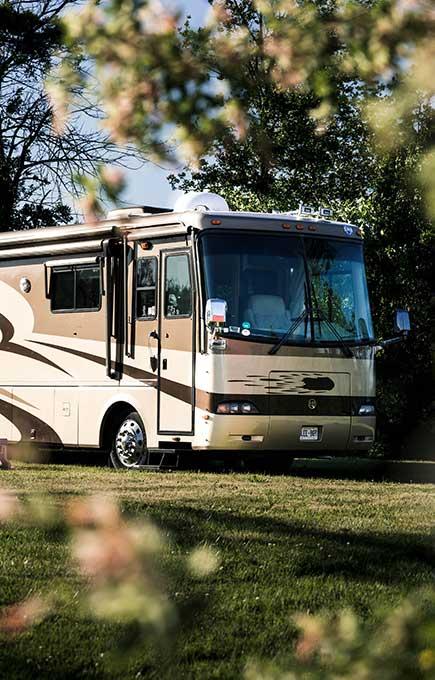There’s nothing like a nice warm shower to get you squeaky clean after a long day of exploring. And thanks to RV showers, you can enjoy that time in the privacy of your own rig without having to wait in line at the campground’s communal showers.
But RV showers typically aren’t like the ones you’d find at home. Not only can they be cramped, but you may also have to deal with a limited water supply (unless you get a water-saving showerhead like this one). We created this nifty guide to help you navigate the ins and outs of RV showers and to teach you how to make the most of them.
Check out these RV rentals to test the waters on this sort of camping.
RVs For Rent Near You
What to expect in an RV shower
If you don’t yet have an RV, you might wonder what to expect in an RV shower.
The first thing to note is that there are 3 types of RV showers:
- RV wet bath
- RV dry bath
- RV outdoor shower
Wet bath vs. dry bath
There are two main types of indoor RV bathroom configurations: the wet bath and the dry bath.
Dry bath RV shower
A dry bath is similar to what you would find in a house. The bathroom has a toilet, sink, and shower, all with its own designated area.
This is most common is bigger RVs — Class A’s, Class C’s, and large trailers.
Wet bath RV shower
A wet bath, on the other hand, has these amenities combined into one space, like an RV shower toilet combo. The entire bathroom floor is waterproof and has a drain.
This is most common in Class B’s and small trailers.
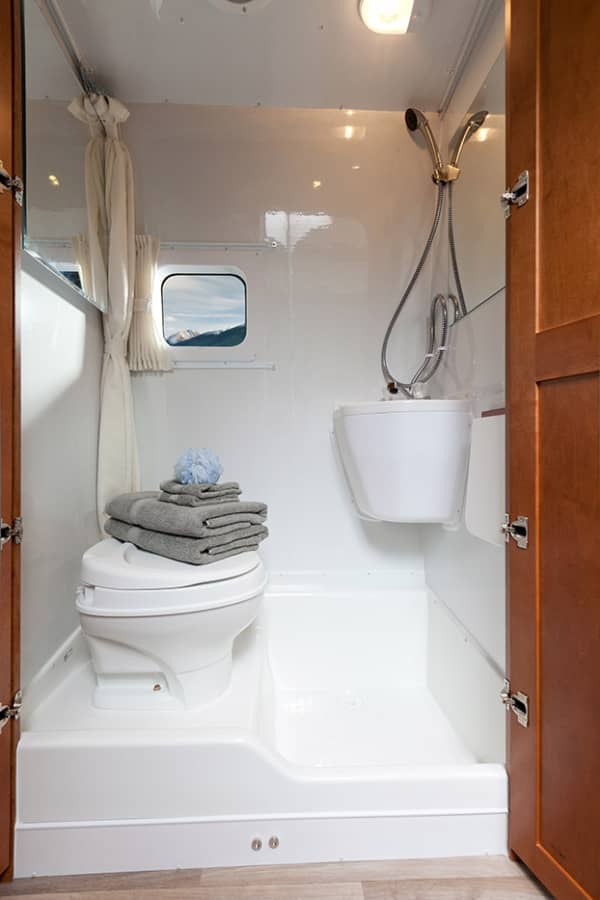
Pros and cons
Both configurations of RV showers have their pros and cons. A wet bath is more spacious, but you have to worry about keeping everything else in the bathroom dry. A dry bath is more like your traditional setup, allowing one person to shower while the other brushes their teeth, uses the mirror, etc. On the downside, the shower stall itself is usually much more cramped.
Dry baths may have a smaller version of a bathtub, but it’s more common to see a shower pan, which are shallow basins that keep water from running out but don’t hold water like a tub.
Outdoor RV showers
An RV outdoor shower is just what it sounds like — a shower outside of the RV. Its simple design features the RV shower head on the outside of the RV. This is a popular option for teardrop trailers and campervans, as it saves space inside of the rig. Though, it is not ideal for colder temperatures.
RV shower similarities
While the specifics will, of course, depend on what type and model RV you have, there are a few things that nearly all will have in common.
- In general, the area will be smaller than residential showers.
- Unless you are connected to a water hookup, your water supply is limited to what is in the freshwater tank. Hot water is even more limited since hot water tanks are only six to ten gallons (compared to the forty-plus gallons that a residential water heater holds).
- Your water will drain into the grey water tank (or black water tank if your rig doesn’t have a grey water tank.)
Luckily, there are several ways to make the most of your shower, even with these limitations!
How to get the most out of your RV shower
When you first purchase your RV, its shower may not be completely optimized for the best experience possible. Try these small fixes to get the most out of your RV shower.
Find the best RV showerhead
The key to the best RV shower experience is the shower head. Here’s what to look for in your RV showerhead:
- water conservation
- ease of use
Water-conserving RV shower heads
First and foremost, your RV shower head should be a water-conserving, low-flow model. Especially if you are dry camping without hookups, conserving water is of utmost importance.
Let’s take a look at the math:
On average, a shower lasts about 8 minutes. A standard residential shower head allows about 3.8 gallons of water per minute to flow. That’s 30.4 gallons of water for a single shower, which may be your entire freshwater tank! This also means you’ll have to dump your wastewater more frequently, which can be an annoying hassle.
An efficient RV shower head, however, can cut that number down by at least 40%, giving you more water for other things like cooking and hydration.
Easy to use RV shower heads
Additionally, many RV shower heads have a wall mount, but can also be handheld with a wand. This allows you to quickly rinse all areas without simply waiting for the water to trickle down. Having a shut-off or low-flow valve for flow control is also a great feature to have for maximum water conservation.
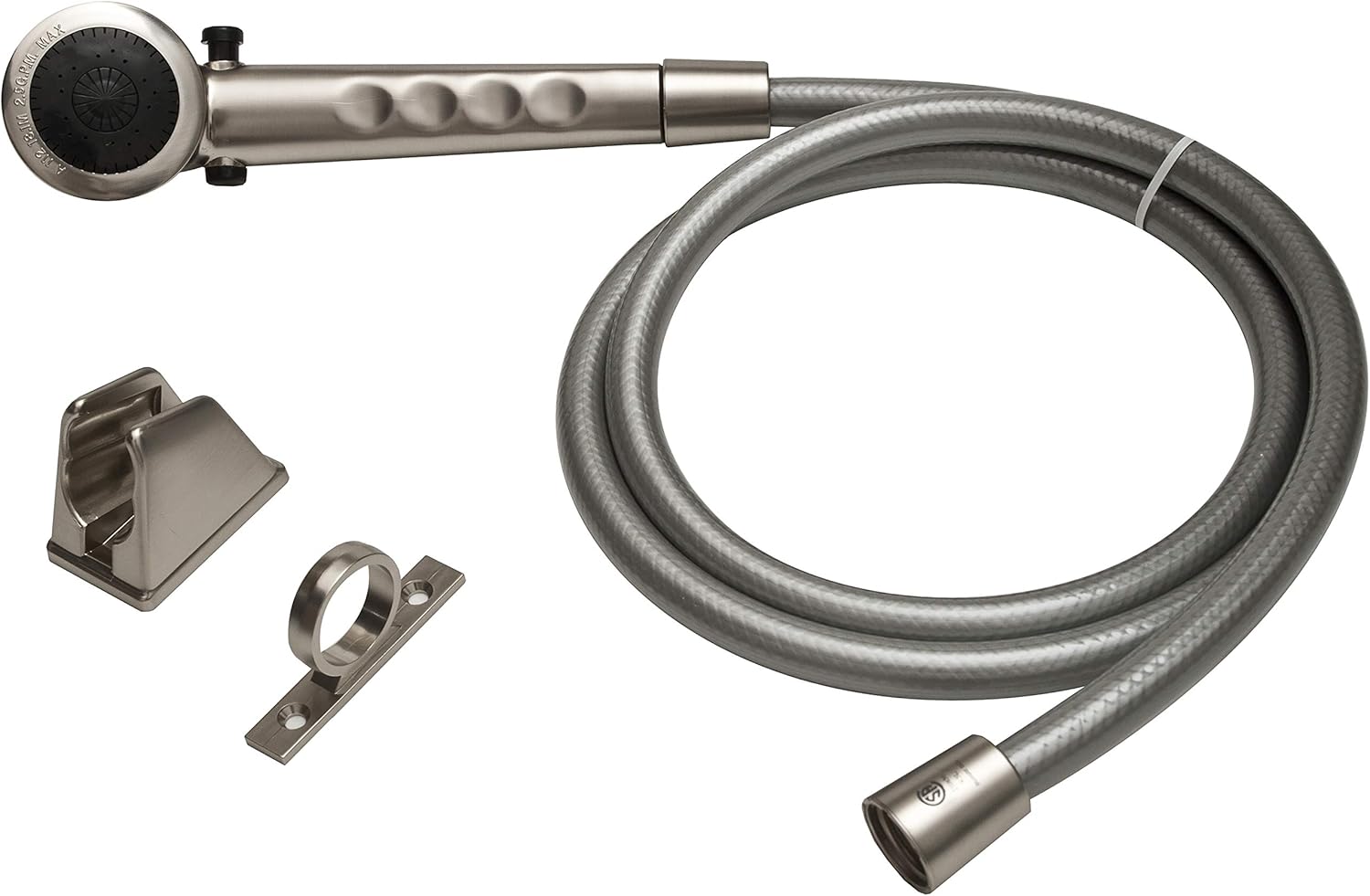
So, when searching for a new shower head, get one with a low GPM (gallons per minute), preferably 2 gallons per minute or less. Read reviews online to learn more about the product’s durability and reliability.
Here are some good RV showerhead options:
- Dura Faucet high pressure RV shower head
- Delta Faucet single spray RV shower head
- Oxygenics Fury handheld RV shower head
Get a good RV shower hose
With a good RV shower head, you want a good RV shower hose. Unfortunately, sometimes the hoses that come with RV shower wands can be stiff and difficult to maneuver. If you find that this is the case, invest in a new hose for increased flexibility. It’ll take some of the frustration out of shower time if you don’t always have to wrangle an unruly hose.
Keeping your RV shower clean
An RV shower may help keep you clean, but that doesn’t mean you can skip cleaning the shower.
The key to shower maintenance is preventing buildup. Soap scum, mildew, dirt, and grime can all cause issues in your shower. The quickest way to clean is just to give your shower a quick wipe down or squeegee after every use.
For a deeper RV shower clean, use a cleanser to wipe everything down. Use a soft sponge or mild abrasive, such as a dryer sheet, which can scrub without damaging any surfaces. Most cleaners that you’d use in a residential shower are suitable. Just make sure to read the label to make sure it is compatible with the material you’re cleaning.
RV shower repairs
You may find yourself needing to make repairs on your shower. If you notice a leak, puddles, or wet spots outside of the shower pan, or anything else that causes concern, address it immediately. Leaks can rot wood and lead to costly damage if not taken care of.
Patching an RV shower pan or bathtub
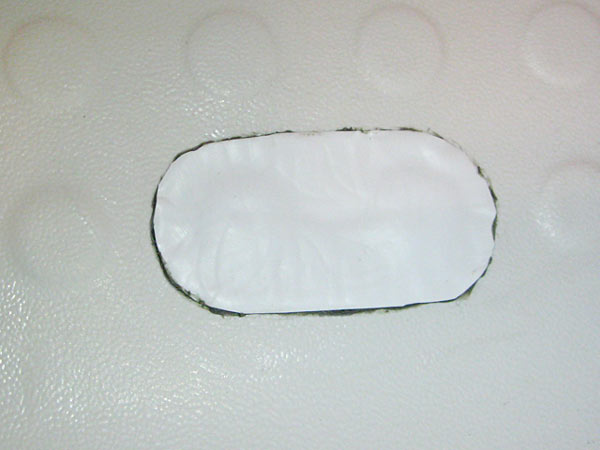
If you find cracks or holes in your shower pan, you can purchase a repair kit to patch them up. You can buy a repair kit at an RV retailer, or, if you’re in a pinch, use repair tape such as Eternabond RV roof repair tape.
If the crack or tear is large, it might be best to simply replace the entire shower pan. This job is a little more involved, and unless you are confident in your DIY abilities, it is usually a job better fit for a professional RV repair person.
RV shower tips
Now that you know how to use and repair an RV shower AND find the best RV shower head, we leave you with our final tips:
- Keep your showers short
- Use a water-saving switch
- Keep an eye on your gray water tank levels
RV Shower Maintenance Tips
Regular maintenance of your RV shower ensures longevity and optimal performance. Here are some essential tips:
- Clean Regularly: Use non-abrasive cleaners to prevent scratches on surfaces. Gentle cloths or sponges are ideal for maintaining the shower’s finish. RVshare
- Check for Leaks: Periodically inspect seals and fixtures for any signs of leakage. Early detection can prevent water damage and costly repairs.
- Monitor Water Pressure: Ensure that your RV’s water pressure remains between 40 and 50 PSI. Pressures exceeding 60 PSI can damage the water system. Enviro Design Products
- Ventilation: After showering, run the exhaust fan or open windows to reduce moisture buildup, which can lead to mold growth.
Upgrading Your RV Shower Experience
Enhance your RV shower with these upgrades:
- Water-Saving Showerhead: Installing a water-saving showerhead can help conserve water without compromising on pressure. Outdoorsy
- Teak Shower Mat: A teak mat elevates you above any residual water, is mold-resistant, and adds a touch of luxury to your shower space. Outdoorsy
- Soap and Shampoo Dispensers: Wall-mounted dispensers reduce clutter and prevent bottles from shifting during travel.
Frequently Asked Questions (FAQ) about RV Showers
Q: How can I conserve water while showering in my RV?
A: Consider taking “military showers,” where you wet yourself, turn off the water to lather, and then rinse off. This method significantly reduces water usage. Camping World Blog
Q: What’s the difference between a wet bath and a dry bath in an RV?
A: In a wet bath, the toilet and shower share the same space, meaning the entire area gets wet during showering. A dry bath has separate areas for the shower and toilet, similar to a residential bathroom. winnebago.com
Q: How do I prevent mold and mildew in my RV shower?
A: Ensure proper ventilation by using exhaust fans or opening windows during and after showers. Regularly clean the shower area with appropriate cleaners and consider using a squeegee to remove excess water from walls and doors.
Q: Can I upgrade my RV shower for better water pressure?
A: Yes, installing a high-quality, water-saving showerhead can improve water pressure while conserving water. Ensure that your RV’s water system can handle the desired pressure to avoid potential damage. Outdoorsy
By incorporating these sections, the guide will offer more comprehensive information, improving its value to readers and enhancing SEO performance.
So fresh and so clean
While RV showers may not be the same as what you have at home, they are a much-welcomed amenity when out on the road. Just by implementing some of these simple tips, you can upgrade your existing shower to work more efficiently, saving you water and a headache.
Have more questions about RVs and their facilities? Check out these guides:
- Guide to RV sinks and faucets
- Guide to RV refrigerators
- Guide to RV propane tanks
- Guide to RV electricity
- Guide to RV air conditioners
You can check out all our RVs for rent right here. Happy travels!




